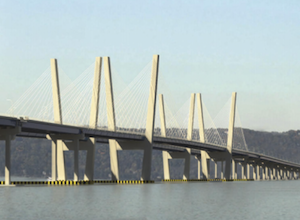Today, the Regional Plan Association held its 23rd Annual Assembly, gathering many of the region's transportation and development players under one roof. Unlike recent years, when the buzz was about congestion pricing or DOT's bicycle and pedestrian programs, this year's program didn't have much to excite livable streets advocates.

Instead, one particular project had the spotlight during today's luncheon, when RPA gave a lifetime achievement award to Thruway Authority Chair Howard Milstein. In his acceptance speech, Milstein praised Governor Cuomo and the Tappan Zee Bridge project. "It should serve as a model for public works projects across America," he said. Apparently without irony, Milstein added that one of the guiding questions for the transit-free project was, "What will best serve the people who rely on this thoroughfare every single day?"
"We recognized the importance of ensuring our project was environmentally sustainable from the start," Milstein said. In announcing the award earlier this month, RPA Chairman Elliot “Lee” Sander praised the replacement bridge's expansion of vehicle lanes across the Hudson River.
Although Milstein's speech was an event centerpiece, the program was headlined by Connecticut Governor Dannel Malloy, who spoke briefly about transit-oriented development in Stamford, where he previously served as mayor, and U.S. Senator Kirsten Gillibrand, who concluded her speech with a full-throated endorsement of the Low Line project, a plan to create an underground park in the former Essex Street trolley terminal below Delancey Street, near the base of the Williamsburg Bridge.
A late-morning forum on the future of Penn Station focused mostly on the immediate political hurdles facing the effort to relocate Madison Square Garden. The arena's special zoning permit is before the City Council for renewal, and MSG is seeking an indefinite permit. A coalition of groups, including RPA and the Municipal Art Society, are proposing a 10-year renewal instead, to allow the city, state, and property owners to embark on a process that would eventually relocate the Garden and reconstruct Penn Station. A City Council vote is anticipated in June, according to MAS President Vin Cipolla.
Vishaan Chakrabarti, a principal at SHoP Architects, told the audience that while the plan to convert the Eighth Avenue post office into Farley Station would only relocate Amtrak facilities and not the underlying tracks, he said it was a necessary component of the larger vision. Without the Farley project, he said, reconstructing Penn Station would be "much like performing open-heart surgery on a jogger while they're running."
At the same time, Chakrabarti said advocates had a right to be cautious about building a "white elephant" with the Penn Station project. "There are a lot of people who are very concerned, with good reason, when they look at the Trade Center site," where the $3.7 billion WTC PATH hub adds no meaningful expansion to transit capacity. The difference with Penn Station, he said, is that there is a need for significant capacity upgrades. "If we focus on this as just an architectural problem, we're going to lose this battle," he said.
The bottom line, panelists agreed, is that MSG, real estate interests including Vornado Realty Trust, and a myriad of state and federal players must all have something to gain from the project. Without a mutually beneficial arrangement, there are simply too many powerful interests to stop any proposal from advancing.
The project would also require significant political leadership. The Robert Moses era, New York Times architecture critic Michael Kimmelman said, "scared people off of the type of aggressive leadership that something like this might require." But there are modern precedents. Pointing to overwhelming support from the state and Mayor Bloomberg for Atlantic Yards, which included the use of eminent domain, Kimmelman said, "You can debate Atlantic Yards, but we can come to an agreement that most people think Barclays itself is a good thing." Kimmelman added that Penn Station might also need what he called "a more aggressive governance."
An afternoon panel on transit and technology spotlighted newly-nominated MTA Chairman Tom Prendergast's affinity for behind-the-scenes upgrades that keep the system in a state of good repair, as opposed to the customer-facing tech tools, like countdown clocks.
"There are times it's an easier sell with technology, because people see the benefit," he said. "Its hard to sell an old deteriorating asset that's falling down behind a wall."
Prendergast added that technology is changing so quickly that by the time the MTA rolls out a new product to the entire system, state-of-the-art technology has already moved on. He also noted that the agency must replace the aging MetroCard fare medium in the next five years. Peter Torrellas of Siemens noted that New York's aging technical infrastructure gives it an opportunity to leapfrog other cities.
Prendergast seemed most excited, though, by the prospect of technology that served both customer and operations needs, citing Bus Time as an example. While the service helps customers know when the next bus will arrive, he said, it also helps bus operations staff reduce bunching and verify if an operator is running the route too quickly or slowly.
After the panel, Prendergast took questions from the press. While he didn't reveal much, he did note that preparations for the next capital budget are rapidly approaching. The capital program will offer a peek into what types of technology and repairs Prendergast thinks are valuable for investment.





